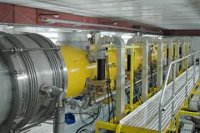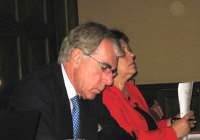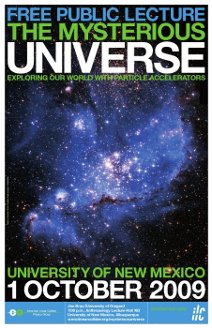From SLAC today: Bringing Power to the International Linear Collider

Accelerator physicists Chris Adolphsen and Chris Nantista with a diagram of the coaxial tap off.
(Photo by Nicholas Bock) |
Measuring in at more than 30 kilometers, the proposed International Linear Collider would be the longest particle accelerator ever built, providing physicists a better view of subatomic world than ever before achieved.
But becoming the biggest isn't easy. The ILC's unprecedented scale presents plenty of challenges, and more than 200 labs and institutions around the world are collaborating to make it work. At SLAC, accelerator physicists Chris Adolphsen and Chris Nantista are working on one point that has proven to be particularly prickly: figuring out how to provide the accelerator with the power needed to drive the machine's high-energy particle collisions.
Read more...
-- Nicholas Bock |
 |
|
|
 |
Upcoming meetings, conferences, workshops
2009 Linear Collider Workshop of the Americas (ALCPG09)
The University of New Mexico, Albuquerque, New Mexico, USA
29 September - 3 October 2009
The mysterious universe - Exploring our world with particle accelerators
Free public lecture by Jim Brau
University of New Mexico, Albuquerque (Anthropology Lecture Hall 163), New Mexico, USA
1 October 2009, 7pm
CLIC09 Workshop
CERN
12-16 October 2009
12th International Conference On Accelerator And Large Experimental Physics Control Systems (ICALEPCS 2009)
Kobe International Conference Center, Kobe, Japan
12-16 October 2009
FCAL Collaboration Meeting
CERN, Geneva, Switzerland
21-22 October 2009
2009 IEEE Nuclear Science Symposium and Medical Imaging Conference
Orlando, Florida, USA
25-31 October 2009
|
|
|
GDE Meetings calendar
View complete ILC calendar
|
|
|
 |
Cryomodule surpasses ILC gradient test
European-XFEL cryomodule using SCRF technology sets new record

The cryomodule that set the world gradient record in the testbench at DESY |
A cryomodule prototype for the European XFEL has set the world gradient record for cryomodules built with superconducting radiofrequency technology, reaching an average accelerating gradient of more than 32 megavolts per metre (MV/m) in recent tests. This is an important step towards major goals set for the ILC’s Technical Design Phase (TDP), which include demonstrating system performance of fully fitted cryomodules like the record prototype. The accelerator module will be built into the FLASH free-electron laser at DESY, making it possible to increase the FLASH energy to 1.2 GeV. This means that even shorter wavelengths down to 4.5 nanometers will be available for experiments starting next year.
Read more...
-- Barbara Warmbein |
 |
|
|
 |
Welcome to Albuquerque!

The campus artworks are making the unique character of the University of New Mexico, the conference venue for currenltly held ALCPG09. The one standing in front of the Student Union Building welcoming ILC community.
|
 |
|
|
 |
From Fermilab Today
28 September 2009
U.S. manufacturer passes SRF cavity benchmark
For the first time, a superconducting radio frequency cavity made by a U.S. manufacturer passed the gradient benchmark required for the proposed International Linear Collider.
Read more... |
|
From IC Russia
28 September 2009
Unique Collider of Heavy Ions to Be Launched in Dubna
The Joint Institute of Nuclear Research, located on Dubna city of Moscow Region, will open new unique colliding facility for heavy ions in 2015.
Read more... |
|
From Times
27 September 2009
Budget Brits take on Cern in hunt for secrets of universe
A small group of British physicists, working a mile underground in a north England potash mine, are taking on the world’s biggest and most expensive particle accelerator in a race to find the universe’s most elusive substance.
Read more... |
|
|
 |
FALC meets in Quebec City

Pierre Coulomb, Chairman of FALC |
The Funding Agencies for Large Colliders (FALC) held its fifteenth meeting at Quebec City on 13 July 2009. FALC serves as the oversight committee for our Global Design Effort (GDE) on Resource Issues as well as meets to discuss more generally the status and funding prospects for large colliders. I was not able to attend this meeting due to a long-term commitment to be in Taiwan for a major review of the Institute of Physics at Academia Sinica. Mike Harrison (BNL), Regional Director for the Americas, very capably filled in for me and presented the GDE status report, while Brian Foster, European Regional Director, discussed our governance studies and GDE administrator Maxine Hronek presented our common fund report.
Read more...
-- Barry Barish
Director's Corner Archive |
 |
|
|
 |
Lecture tonight!

Jim Brau will talk about particle accelerators and the mysterious universe tonight at the University of New Mexico – don't miss it!
ILC Report
2009-021
IDAG Report on the Validation of Letters of Intent for ILC detectors
arXiv preprints
0909.5148
Lepton-Specific Two-Higgs Doublet Model: Experimental Constraints and Implication on Higgs Phenomenology
0909.4812
Higgs boson phenomenology and VEV shift in the RS scenario
0909.4662
SUSY Predictions for the LHC
0909.3960
Precision Polarimetry at the ILC: Concepts, Simulations and experiments
|
|

